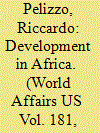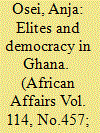| Srl | Item |
| 1 |
ID:
163920


|
|
|
|
|
| Summary/Abstract |
The purpose of this article is to analyze Africa’s progress along the developmental path in the past few decades, to understand what factors were responsible for such success and to identify the risk factors that may compromise further development in the region in the years to come. We advance three basic claims: that Africa has experienced an almost unprecedented (by its standards) level of economic success in the first 15 years of the new millennium, that this success was made possible by a combination of domestic and supranational conditions, and that some of the enabling conditions that supported Africa’s growth and development in the new millennium may be disappearing. The study also suggests that while African countries may not be able to influence the global conditions on which their economic success depends, they do have the ability to influence the domestic conditions. This is why, we suggest, in addition to ensuring longer and healthier lives for their citizens, African countries should consolidate democracy and promote good governance.
|
|
|
|
|
|
|
|
|
|
|
|
|
|
|
|
| 2 |
ID:
141477


|
|
|
|
|
| Summary/Abstract |
This article presents new theoretical and empirical insights into democratization in Africa, using the typology developed by John Higley and Michael Burton to understand elite interaction in Ghana. Social network analysis (SNA) is used to test the main proposition of the Higley/Burton theory, namely that a ‘liberal democracy is impossible without a consensually united elite’. Empirical evidence is provided from a unique data set that maps the interaction patterns between Members of Parliament elected to the Ghanaian legislature in 2012. The article shows that MPs in Ghana form a dense and strongly interconnected network bridging ethnic and party cleavages, and that MPs from different parties have developed a measure of trust in one another. These findings not only support Higley and Burton's claim that elite integration is conducive to stable democracy, but also point to new directions in African Studies by demonstrating the capacity of actor-centric approaches to explain processes of democratization in countries that lack the classic structural preconditions for consolidation.
|
|
|
|
|
|
|
|
|
|
|
|
|
|
|
|